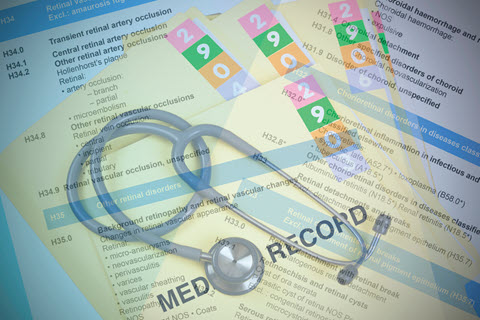Prepare now for more detailed Z79 diagnosis codes.
Back in July, the Centers for Disease Control and Prevention (CDC) posted a list of nearly 1,500 new codes that will join the ICD-10-CM code set beginning Oct. 1, 2022. Among the changes otolaryngology coders should look out for in Chapter 21, Factors Influencing Health Status and Contact with Health Services, are a handful of new Z codes and guidelines that clarify proper application.
Here is a breakdown of the codes, along with some expert analysis to help you add them to your coding arsenal.

Know When and Why You Report Z79 Codes
Codes in category Z79 (Long term (current) drug therapy) help to paint a complete picture of clinical circumstances. You may use them to explain why a patient is presenting for care, to demonstrate case complexity and medical necessity, as well as to support the level of medical decision making (MDM).
Section I.C.21.c.3 of the ICD-10-CM Official Guidelines instructs you to “assign a code from Z79 if the patient is receiving a medication for an extended period as a prophylactic measure … or as treatment of a chronic condition … or a disease requiring a lengthy course of treatment.”
Review New Options for Extended Med Use
Currently, the code set goes from Z79.5- (Long term (current) use of steroids) straight to Z79.8 (Other long term (current) drug therapy). Going forward, you can account for the use of immunotherapies, chemotherapeutic agents, and injectable antidiabetic drugs with the following:
o Z79.60 (Long term (current) use of unspecified immunomodulators and immunosuppressants)
o Z79.61 (Long term (current) use of immunomodulator)
o Five six-character codes under Z79.62- (Long term (current) use of immunosuppressant)
o Five six-character codes under Z79.63- (Long term (current) use of chemotherapeutic agent)
o Z79.64 (Long term (current) use of myelosuppressive agent)
o Z79.69 (Long term (current) use of other immunomodulators and immunosuppressants)
Coding alert: Don’t forget to check out the updated guidelines, as there are some new Excludes2 notes sprinkled throughout category Z79 to which coders should pay attention.
“Adding a diagnosis from this expanded category provides a better electronic explanation of these tests or treatments,” explains Carol Pohlig, BSN, RN, CPC, ACS, senior coding and education specialist, University of Pennsylvania Department of Medicine. “When patients present for infusion services or require laboratory testing to ensure drug efficacy and safety, the claim reporting is better serviced with the addition of a specific Z79 code that identifies the therapy the patient is receiving,” she adds.
Log Unique Codes for Patient Noncompliance
When patients don’t comply with medical orders, it’s important to note that fact in their medical records, and in some cases, you also need to share that information with insurers. A crop of new ICD-10-CM codes can help you do that. Come October, you’ll be able to report various reasons for a patient’s inability or unwillingness to follow medical treatment with the following:
ICD-10-CM 2023 also adds “a new category of codes that allow for the assignment of caregiver noncompliance and reasons for such noncompliance,” which you could only document previously with a code for “other noncompliance,” according to Amy Pritchett, CCS, CPC-I, CPMA, CDEO, CASCC, CANPC, CRC, CDEC, CMPM, C-AHI, senior consultant at Pinnacle Enterprise Risk Consulting Services LLC, in Centennial, Colorado.
Under this new category, Z91.A- (Caregiver’s noncompliance with patient’s medical treatment and regimen), you’ll find several analogous codes to the patient noncompliance codes, including Z91.A10 (Caregiver’s noncompliance with patient’s dietary regimen due to financial hardship) and Z91.A9 (Caregiver’s noncompliance with patient’s other medical treatment and regimen).
But Z91.A- also introduces the following novel codes that provide greater specificity for caregiver noncompliance:

Consider Updated Guideline Before Coding Underdosing
Along with the new codes, you’ll need to keep an eye out for the updated wording of underdosing guideline I.C.19.e.5.(c), which will affect the way you assign new codes Z91.A28 and Z91.A3, along with the numerous other underdosing codes currently found throughout ICD-10-CM.
The new verbiage states that “documentation of a change in the patient’s condition is not required in order to assign an underdosing code. Documentation that the patient is taking less of a medication than is prescribed or discontinued the prescribed medication is sufficient for code assignment.”
So, the medical record simply needs to show the patient is not taking the prescribed dose of a medication, not that underdosing is adversely affecting the patient’s condition. Under such circumstances, you can then go ahead and code T36-T50 for the underdosing, along with the appropriate noncompliance (Z91.12-, Z91.13-, Z91.14-) or complication of care (Y63.6-Y63.9) code(s) according to the current guideline.
Don’t forget to document and code any applicable social determinants of health (SDoH); for example, the patient cannot afford the medication, and that’s why they reduced the dose or stopped the drug. SDoH codes enable you to form a comprehensive picture of the social context your practice’s patients find themselves. This not only allows for data collection, but also serves to give the physician credit for the complexities and risk associated with the underdosing.
Coding tip: You should not assign an underdosing code as a principal code “if a patient has a relapse or exacerbation of the medical condition for which the drug is prescribed because of the reduction in dose,” per the existing guideline. In such cases, it instructs you to code the patient’s medical condition as the first-listed code.
